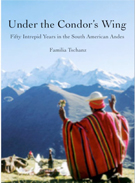"I have a sense of waiting, too. Of waiting for some next step in our lives to unfold"

 |
Under the Condor's Wing by Familia Tschanz
book review by John E. Roper
One of the greatest challenges of living overseas is not the time spent in a foreign land but in coming home. Well-meaning people ask about life "over there," but when the tales begin to tumble out of the traveler's mouth often the eyes of the hearer glaze over and the topic is changed. It is not that listeners are intentionally rude or uninterested; the subject is simply too alien for most of them to grasp. The authors have solved this problem by taking the bold step to show their lives in Latin America through personal letters, poems, and reflections rather than simply tell their story conventionally. This narrative technique gives a sense of intimacy to their tale that no traditional telling can match.
The Tschanzs' story takes place in several countries, spans over fifty years, and is told in a variety of voices. The most dominant ones, at least in the first two-thirds of the book, come from Mac and his wife Ginny. Mac shows readers the beauty of the Bolivian and Colombian countryside coupled with the ugliness of the political and social turmoil in these lands during the 1960s. What comes across most, though, is his passion for his work. Ginny's letters reveal the struggles of managing a household overseas along with personal battles such as lingering illness and frustration. Later, sons Tor and Michael, daughter-in-law Dawn, and granddaughter Meghan give voice to their own adventures in Central and South America to round out the book. The Tschanzs could have played it safe and written a standard memoir. Instead, they opened up their lives through words written in the moment and made their story real.